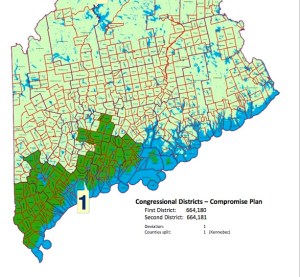AUGUSTA — After more than two months of partisan saber-rattling, the Legislature on Tuesday overwhelming approved a congressional redistricting plan.
The House voted 140-3 and the Senate 35-0 to ratify the new plan. The map shifts several towns in Kennebec County to new districts, including Waterville, but it is a stark departure from a Republican proposal that would have moved Androscoggin, Oxford and a portion of Franklin County from the 2nd to the 1st Congressional District.
The initial GOP plan also would have moved North Haven, the hometown of U.S. Rep. Chellie Pingree, D-Maine, into the 2nd District.
Floor discussion on the compromise proposal was limited Tuesday. However, several Republican senators expressed relief that the two sides had reached a consensus.
Sen. Lois Snowe-Mello, R-Poland, in August expressed some reservations about the first GOP proposal because of its plan to shift Androscoggin County into the 1st District. On Tuesday, Snowe-Mello said she was happy to have avoided that outcome.
Sen. Roger Katz, R-Augusta, said he was relieved that neither party had been forced to “give up our principles.” Katz said that while there are some “ideologically pure” partisans, the vast majority of constituents he spoke to were turned off by the partisanship in Washington and in the redistricting talks.
“Those people say, ‘Please don’t be like Washington,'” Katz said. “Today, as we did with the budget in June, we did that. … We are acting like grownups.”
The deal reached Tuesday leaves much of the U.S. House districts the same as they are now. It also leaves Pingree’s hometown of North Haven in the 1st District.
The plan moves Waterville and Winslow from the 2nd District to the 1st.
Moving from the 1st District to the 2nd are Unity Township, Albion, Sidney, Belgrade, Rome, Vienna, Mount Vernon, Gardiner, West Gardiner, Monmouth and Randolph.
The redistricting of Waterville, a Democratic-leaning district, could affect U.S. Rep. Mike Michaud, D-Maine, in 2012. However, Michaud said in a statement that he was pleased “Maine didn’t turn into Washington” and instead reached a compromise.
“While I’m disappointed to lose a number of Kennebec County communities, including Waterville, we’re really one Maine at the end of the day,” Michaud said. “Regardless of district lines or political party, our congressional delegation has a long tradition of working together to advocate for our state, and nothing today changes that.”
Pingree, also in a statement, said, “I am glad that the Legislature was able to set aside radical, partisan redistricting proposals and come to a bipartisan agreement.”
House Speaker Robert Nutting, R-Oakland, said he was glad the Legislature didn’t punt to the courts. Several recent redistricting battles have been settled in court.
“Perhaps the best thing about this development is that legislators chosen by the people of Maine, and not the courts, will be deciding where the state’s congressional districts will be drawn,” Nutting said in a statement.
Both parties appeared to be under pressure from national interests to pursue a redistricting plan that gave them a chance for victories in the 2012 election. And, because Maine is one of only two states that award electoral votes to a candidate who wins a congressional district, the battle potentially had implications for the upcoming presidential election.
While other redistricting battles are under way in other states, Maine’s came a lot sooner after a federal court ordered lawmakers to redraw the state’s two congressional district lines to reflect 2010 census changes and balance the populations of the two districts.
After Democrats refused to back the initial Republican plan, and after other compromise efforts by both sides flagged, Republicans as recently as Monday morning threatened to use the party’s majority power in the Legislature to bypass the two-thirds vote requirement.
However, the GOP abandoned that effort Monday night, leaving some Democrats to speculate that the party couldn’t muster support for what some described as a “radical plan.”
The initial GOP plan was destined for review by the courts. Democrats believed the plan would not survive court scrutiny if Republicans forced it through with their majority power.
The Associated Press contributed to this report.

Comments are no longer available on this story